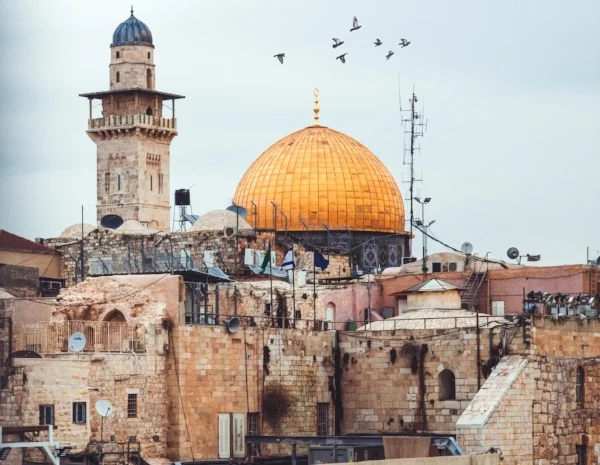The Man From Salalah
The following piece was written by PCI's Nathan Elmore and recently published in the Richmond Times-Dispatch.
As daylight blurred into nightfall, I sat quietly in a plane on a runway flanked by desert in Riyadh, Saudi Arabia. I was nearing the completion of a long trip from Washington, D.C. to Muscat, the capital of Oman—a country occupying the southeastern part of the Arabian Peninsula. This American—a collage of Texas and Ohio, with a bit of Illinois, Oregon, South Carolina and Virginia thrown in—was bracing to begin a two-week graduate seminar in Christian-Muslim relations at Al Amana Centre in Muscat.
Having been moved to the exit row for the Riyadh-Muscat flight, I settled nicely into my comfortable chair—right next to the man from Salalah.
A casually dressed Omani, he was young, in his 20s. He spoke English fluently. As it turned out, he was on his way home from Iowa, where he taught Arabic at a small liberal arts college. The cultural symmetry was hard not to appreciate: American heartland, Muslim heartland. After we eventually parted ways in Muscat, he would finish his even longer trip by flying the final leg to his beloved Salalah, a port city near the southern tip of Oman.
Before 9/11, in his book A History of Christian-Muslim Relations, Hugh Goddard proposed that because of migration, travel and technology the question of how Christianity relates to other religions would surface as the preeminent theological question facing Christians in the early 21st century. Goddard was right on so many levels. At 30,000 feet, for instance, the incessant intra-Christian debates on the finer points of Calvin’s esteemed doctrines or on the ordination of women do not appear front-and-center. What is pressing is this: How do you talk to the man from Salalah?
As the plane taxied for takeoff in Riyadh, I channeled Dorothy and that fabled Land of Oz. Once in the air, though, it was Rowan Williams who came to mind. The outgoing Archbishop of Canterbury has recently reminded the Christian church at-large that not only is this geography the birthplace of Islam but also it is in the vicinity of the origins of Christianity. In America, in particular, it seems a thousand times more likely that we’d forget that the Christian faith was born in the East, not in the West.
By now, the man from Salalah and I were suspended among the clouds, engaged in a wide-ranging conversation. Yet between him and me hung an obvious haze of modern global politics—not to mention the relentless myth-making about a clash of civilizations and notions of cultural superiority. The truth is this: in Christian-Muslim relations, a varied and textured history of constructive intercultural exchange exists among the periodic outbursts of turbulence.
Here was a man from Salalah, for example, an Arab Muslim, contributing to the educational mission of a college in Iowa. All the while, and rather ironically, he may or may not know (as we may or may not know) that our Western concept of “the university”—with its department “chairs,” “academic circles,” and “degrees”—is indebted to Muslims and to early Medieval Islamic culture in centers like Cairo. Surely this is even more surreal than sitting in a chair in the sky.
I asked him about his hometown. What he began to describe was a beautiful city framed by jagged mountains and the ubiquitous desert. Honestly, I had read as much in my basic preparations for Oman. What I did not know—what the man from Salalah told me—was that his city, due to its location along the Arabian Sea, goes lush green in the summers—the result of the monsoon season called khareef. He spoke for a while about the array of fruits and vegetables grown in and around Salalah.
For a peninsula known for its harsh environments, physical and religious, here was a delightful surprise: they grow bananas in Arabia! From the perspective of this American Christian, the analogy seemed clear: Even when you know a little about Islam or Muslims or Muslim culture, there is still more to be discovered in person.
My new acquaintance carried the conversation further. Salalah, he said, is the de facto capital of frankincense—that ancient spice for which kings would travel the world, and not by plane. And what is the strongest association that a new-world Christian maintains regarding this spice? Whether those Magi who came bearing gifts to Jesus were actually from Persia or Arabia, either way, they most likely got their frankincense from this city, or region, which would eventually send Iowa an Arabic teacher in 2011. Only Jesus himself could’ve predicted this development.
Right before we said our good-byes, a lasting metaphor arrived. When you sit beside someone in the exit row of a plane, it’s very natural and quite important to give at least some thought to the passenger responsibilities at hand, right? These are genuinely serious matters, indeed.
Likewise, for good-will Christians and Muslims, there is so much—locally and globally—for which we desperately need to take individual and collective responsibility. Encountering the man from Salalah, I was starkly reminded: we must persist, against the odds, in pursuing mutual responsibility alongside each other. And, as ever, Christians and Muslims do so across our formidable barriers and precisely in spite of our resilient differences.
More from Nathan can be found on his personal blog.










